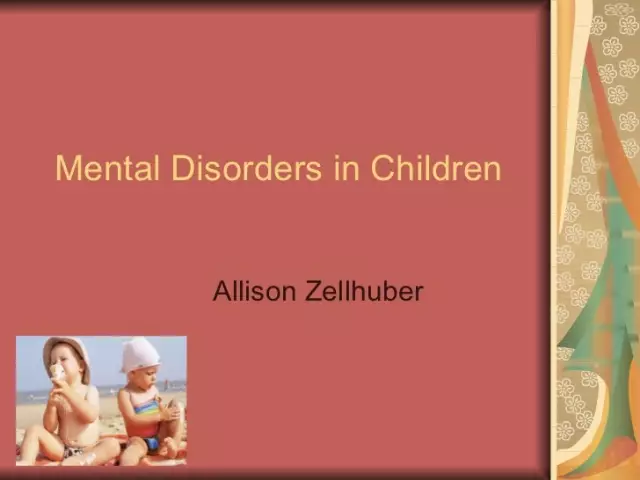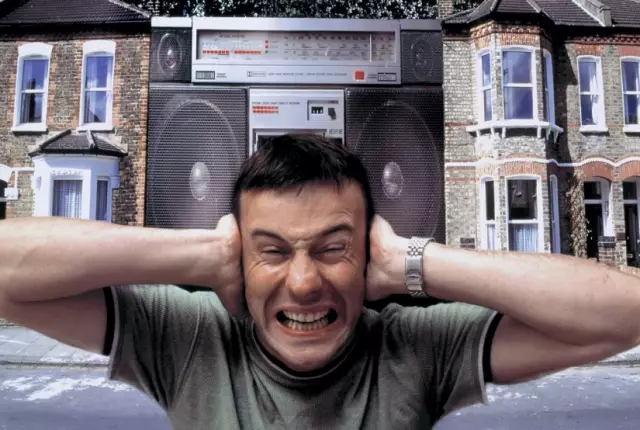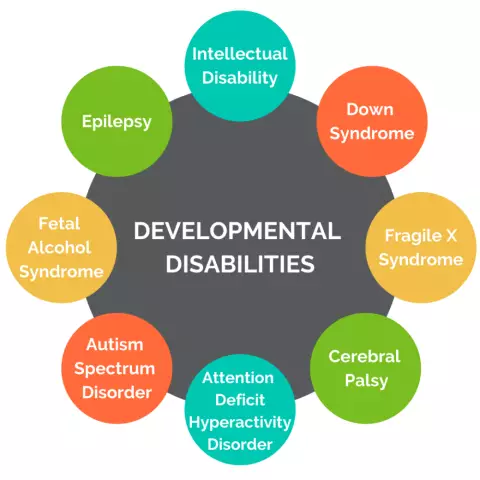- Author Rachel Wainwright wainwright@abchealthonline.com.
- Public 2023-12-15 07:39.
- Last modified 2025-11-02 20:14.
Mental disorders in children
It happens that a child differs significantly from his peers - he cannot cope with what is easily given to other children, and his mental development does not correspond to the norms. Now they prefer to call these children "special child". Impaired mental development of a child is a great test and grief for parents. Not everyone is able to withstand this burden, realizing that in the future their baby may turn out to be an outcast of society. Meanwhile, mental disorders in children are often amenable to correction.
Mental impairment or norm

In the course of diagnosing a child's mental development, experts use norms that are in fact averaged indicators, therefore, they are rather arbitrary. So if a baby learns the skills of movement, speech or learning a little later, this is not a reason to believe that he has mental disorders. It happens that children at an early age have some inconsistency with the norms of development of the intellect or psyche, but at an older age, they show simply outstanding results.
Sometimes parents start to sound the alarm if their child does not speak at all until the age of two. In fact, this is normal, since vocabulary is accumulating during this period. Then these children begin to speak at once well and a lot. In what cases should it be considered that a child has mental development disorders?
First of all, it is worth noting that children with intellectual disabilities have quite strong brain abnormalities. They have no or poorly expressed attention, interest in learning, curiosity, craving for new knowledge. In addition, children with intellectual disabilities are characterized by personal immaturity, and their mental development is quite noticeably behind the age norms. In infancy, these babies have weak sucking and grasping reflexes. Certain physical features also indicate a certain defect. In the presence of mental disorders, even at birth, children have a low weight, a disproportionate physique, a small or, conversely, a large head.
Types of mental disorders
Today, experts distinguish the following groups of children with mental disabilities:
- Children with mental retardation (oligophrenics in the stage of debility, imbecility, idiocy);
- Children with mental retardation (fully or partially reversible);
- Children with impaired mental development or dementia (often preceded by a period of normal mental development);
- Children with developmental deficiencies or sensory impairment (hearing, vision, musculoskeletal disorders);
- Children with manifestations of mental illnesses such as schizophrenia, hysteria or epilepsy;
- Children with psychopathic behaviors, including early childhood autism.
It is necessary to distinguish between mental retardation and mental retardation. With mental retardation, there are more gross violations of intelligence and mental health. In this case, mental development disorders are irreversible, the dynamics of their development is characterized by the severity of the condition, as well as the prognosis of further decay of functions. In special cases, the correction of such violations is almost impossible.
Children with mental retardation have a number of their own characteristics, however, the correction of their development is not only possible, but also quite successful. It happens that subsequently such children even catch up with their peers in development.
Another case is mental disorders in children, from birth suffering from defects in hearing, vision, speech apparatus. At birth, their mental abilities are within normal limits, but do not develop from the first days of life due to reduced vision or hearing. As a result, there is a lag in intellectual development. In this case, the correction also brings very tangible results.
Causes of developmental disorders in children

There is a whole range of causes that can ultimately cause mental impairment in children - genetic damage, trauma or physical underdevelopment as a result of poor nutrition. It happens that brain disorders in a child occur even before birth, during childbirth or in early childhood.
Often, mental retardation is associated with other diseases - epilepsy or cerebral palsy, sometimes it is associated with autism. As for genetic diseases that can cause mental disorders, among them are muscular dystrophy, tuberous sclerosis, neurofibromatosis. In addition, unexplained changes in chromosomes - Down syndrome - can become the causes of developmental disorders in children.
Infectious diseases suffered by a woman during pregnancy - rubella, toxoplasmosis, taking certain medications, excessive use of alcohol and drugs can also cause mental impairment in the child. Other causes of impaired development of children are difficult pregnancy, during which there was oxygen starvation of the fetus, asphyxia at birth or birth trauma, some infectious diseases suffered in early childhood, intoxication.
It happens that mental retardation is observed in the absence of upbringing on the part of parents who do not work with the child, talk little to him. Or when a child at an early age is isolated from the mother for some reason. In these cases, the correction is also mostly successful.
Children with intellectual disabilities need more time to learn or acquire skills. But this does not mean that it is not necessary to deal with such children, and their development is impossible. They just need a special approach. And parents need to be patient and have faith in their child. And the most important thing is to never compare him with other children.
Found a mistake in the text? Select it and press Ctrl + Enter.






